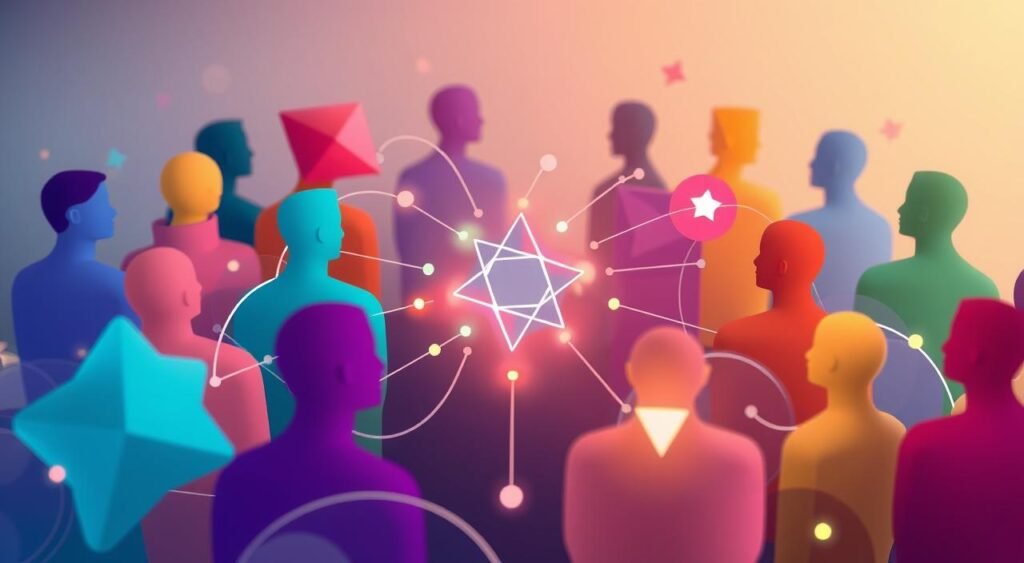El trabajo en equipo ocurre cuando un grupo de personas trabaja juntas hacia un objetivo común. Es una herramienta crucial para la eficiencia organizacional. Trabajar en equipo puede hacer que las tareas se completen más rápido y de manera más eficiente.
Además, mejora la resolución de problemas y el éxito organizacional. Los beneficios incluyen una mejor comunicación, ideas más originales y la creación de metas comunes. También fomenta la confianza y el desarrollo de habilidades de resolución de problemas.
El trabajo en equipo contribuye a una cultura corporativa positiva. Esto aumenta la motivación y el compromiso de los miembros del equipo.
Key Takeaways
- Teamwork increases organizational efficiency by completing tasks faster and more effectively.
- Improved communication within teams leads to greater efficiency and workplace productivity.
- Brainstorming in teams results in greater originality in projects.
- Setting common goals strengthens project alignment and achievement of objectives.
- Working in teams enhances the effectiveness of problem-solving.
Understanding Organizational Teamwork Fundamentals
Effective teamwork is key to success in any organization. It’s about a group working together towards a goal. The success of a team depends on three main things: a dedicated team, a clear organization, and a shared goal.
Key Elements of Effective Team Collaboration
Building a team with different skills and experiences is important for collaboration. Each person brings their own ideas and skills. This mix helps solve big problems better. The team’s structure is also key, as it outlines roles and holds everyone accountable.
Also Read: Cómo está transformando la educación a distancia la experiencia universitaria?
Core Principles of Team Dynamics
Good team dynamics start with a few key principles. Everyone needs to contribute and support each other. The team should always look for ways to get better. This helps keep the team strong and effective.
Building Blocks of Successful Team Integration
For a team to work well, some things are essential. Open communication is key, letting everyone share their thoughts. Building trust is also important, making sure everyone feels they can count on each other. Using everyone’s strengths helps the team reach its goals together.
Also Read: Cómo mejorar tu Fotografía de viajes y capturar momentos únicos?
«Alone we can do so little; together we can do so much.» – Helen Keller
Trabajo en equipo: Impact on Organizational Success

Teamwork is key to a company’s success. It boosts productivity, innovation, and keeps employees happy and loyal. This teamwork makes a big difference in how well a business does.
Teams that work well together keep their employees longer. This means less money spent on hiring and training. It also makes employees more engaged and proud of their work.
Offering fun team activities, like sports or celebrations, helps build a strong team spirit. Even with remote work, it’s important to keep the team feeling connected. This helps everyone work better together.
HR teams are crucial in creating a team-focused culture. They help pick and train employees who fit well with the team. Leaders must also show they value teamwork by working together and solving problems.
Also Read: Cortometrajes y su Evolución
It’s important to track how well teamwork is doing. This helps see if efforts to improve teamwork are working. A culture of open communication and trust can lead to amazing innovation and success.
«Teamwork is the ability to work together toward a common vision. The ability to direct individual accomplishments toward organizational objectives. It is the fuel that allows common people to attain uncommon results.»
Enhancing Communication and Decision Making

Effective teamwork is key to better communication and decision-making in organizations. It helps teams share important information and come up with new ideas. This leads to smarter problem-solving as everyone works together to find the best solutions.
Fostering Open Dialogue Among Team Members
It’s important to create a space where everyone can talk openly. When team members feel free to share, they’re more likely to help make decisions. This openness helps everyone understand the company’s goals better.
Strategic Problem-Solving Through Collaboration
Good teamwork means solving problems together. Team members use their different skills and views to tackle big challenges. This way, they come up with creative and complete solutions, building on each other’s ideas.
Also Read: Qué es un Trabajo de Medio Tiempo y Cómo Empezar Uno?
Building Trust and Transparency
Trust is the base of strong teamwork. Through team activities and clear communication, teams feel safe to share and take risks. This trust is vital for making better decisions and working together to reach goals.
«Teamwork is the ability to work together toward a common vision. The ability to direct individual accomplishments toward organizational objectives. It is the fuel that allows common people to attain uncommon results.»
Productivity and Performance Benefits

Effective teamwork boosts productivity and performance in organizations. It allows tasks to be divided based on team members’ strengths. This leads to quicker and better results.
Sharing tasks helps prevent burnout. It keeps everyone motivated and working well together. This creates a positive work environment.
Studies show teams of three to five can solve problems better than the best individual. Diverse teams are also up to 35% more creative. This is according to a McKinsey & Company study.
Good teamwork also improves employee well-being. A survey found that team members feel 80% better emotionally in supportive teams. Happy employees are up to 20% more productive, as shown by the University of Warwick.
Also Read: Qué es la investigación académica y cómo se lleva a cabo?
Teams can take smarter risks, leading to new ideas. Open discussions spark creativity and bring out innovative solutions.
«Teams are often capable of taking smarter risks, leading to innovative ideas, due to the collective support system that allows for bolder actions without individual repercussions.»
In summary, teamwork greatly improves productivity and performance. By encouraging collaboration and open communication, organizations can achieve more. They will see better efficiency, creativity, and success.
Cultural and Motivational Advantages

Teamwork in an organization brings many benefits. It creates a positive work culture that makes employees happy and engaged. This leads to better job satisfaction.
When teams work together, they feel like a family. This creates strong team relationships. It helps solve problems and supports each other. Success in team efforts makes everyone feel good and work better together.
Creating a Positive Work Environment
Good teamwork makes a workplace where everyone feels important. It’s a place where people can talk openly and solve problems together. This makes work more enjoyable and fulfilling for everyone.
Employee Engagement and Satisfaction
Being part of a team makes people care more about the company’s success. The joy of working together boosts morale and job happiness. This leads to more productivity, less time off, and happier employees.
Building Strong Team Relationships
Strong team bonds are key to working well together. Team members learn to appreciate each other’s strengths. This builds trust and helps solve problems together, making the workplace better for everyone.
«Teamwork is the ability to work together toward a common vision. It is the fuel that allows common people to attain uncommon results.»
Innovation and Creative Problem Solving

Teamwork sparks creative problem-solving and innovation. Diverse teams offer different views and skills, leading to better solutions. Brainstorming in teams brings more and better ideas, thanks to a safe space for risk-taking.
Teams tackle complex problems from many sides, finding innovative answers. This collective creativity helps businesses stay ahead. A study found 55 community contributions highlighted top experts in Innovation and Creative Problem-Solving in Business Coaching. de las de un para el que se.
Methods like Brainstorming, SCAMPER, Mind Mapping, and Brainwriting boost creativity. Teams can then evaluate ideas based on their feasibility and alignment with the organization’s goals.
- Identifying the problem is the first step in creative problem-solving. Tools like the 5 Whys help understand the problem’s root cause.
- Testing ideas is made easier with methods like the Plan-Do-Check-Act Cycle. These help in planning and improving solutions.
- Feedback is key for growth. Tools like the Feedback Sandwich help leaders give constructive feedback.
By focusing on skills and the right tools, teams become creative and innovative powerhouses. A culture of innovation and creative-thinking is crucial. It allows for a safe space where failure and learning are valued in Business Administration and Business Coaching.
«Cultivating an environment where ideas flow freely and failures are seen as stepping stones to innovation helps foster a culture of creativity in the Business Coaching field.»
Also Read: 10 Películas Que No Sabías Que Estaban Basadas En Hechos Reales
Conclusion: The Future of Team-Based Organizations
The future of successful organizations is in team-based structures. As the business world gets more complex, teamwork will be key. Companies that focus on teamwork can adapt to changes, innovate, and stay ahead.
Investing in team development and creating a collaborative work culture is crucial. Using technology for virtual teams will also be important. Teamwork boosts productivity and makes organizations more resilient and adaptable.
By valuing teamwork, companies can face future challenges better. Moving to team-based organizations is a big change. It focuses on the benefits of working together effectively.
FAQs
Q: ¿Qué es el trabajo en equipo?
A: El trabajo en equipo es un enfoque colaborativo en el que un grupo de personas trabaja conjuntamente hacia un objetivo común, aprovechando las habilidades y fortalezas individuales para mejorar la eficiencia y efectividad en la organización.
Q: ¿Qué beneficios aporta el trabajo en equipo a una organización?
A: El trabajo en equipo aporta numerosos beneficios a una organización, incluyendo una mayor creatividad, mejor comunicación, y una capacidad mejorada para resolver problemas, lo que resulta en un rendimiento óptimo y la consecución de objetivos organizacionales.
Q: ¿Cuál es la importancia del trabajo en equipo en la gestión de proyectos?
A: La importancia del trabajo en equipo en la gestión de proyectos radica en que facilita la colaboración, permite una mejor distribución de responsabilidades y recursos, y asegura que diferentes perspectivas se integren, lo que mejora la calidad de los resultados finales.
Q: ¿Cómo puede el liderazgo facilitar el trabajo en equipo?
A: El liderazgo puede facilitar el trabajo en equipo al establecer una visión clara, motivar a los miembros del equipo, fomentar un ambiente de confianza y comunicación, y proporcionar el apoyo necesario para que cada miembro contribuya de forma efectiva.
Q: ¿Qué es la comunicación efectiva dentro del trabajo en equipo?
A: La comunicación efectiva dentro del trabajo en equipo es la capacidad de intercambiar información de manera clara y concisa, asegurando que todos los miembros estén alineados con los objetivos y tareas, lo que mejora la cohesión y la productividad del grupo.
Q: ¿Cómo se puede mejorar la creatividad a través del trabajo en equipo?
A: La creatividad se puede mejorar a través del trabajo en equipo al permitir que las ideas fluyan libremente y se combinen, lo que lleva a soluciones innovadoras que quizás no surgirían en un entorno de trabajo individual.
Q: ¿Qué es un equipo de trabajo efectivo?
A: Un equipo de trabajo efectivo es aquel que tiene una clara estructura y roles definidos, donde los miembros colaboran de forma armoniosa, comparten responsabilidades y se apoyan mutuamente para alcanzar los objetivos establecidos.
Q: ¿Qué desafíos puede enfrentar el trabajo en equipo?
A: Los desafíos del trabajo en equipo pueden incluir conflictos interpersonales, diferencias en la comunicación y la falta de claridad en los roles y responsabilidades, que pueden obstaculizar el rendimiento y la cohesión del grupo.
Q: ¿Por qué es importante fomentar el trabajo en equipo en la cultura organizacional?
A: Fomentar el trabajo en equipo en la cultura organizacional es importante porque promueve la colaboración, mejora la moral de los empleados y contribuye a un ambiente laboral positivo, lo que a su vez puede llevar a una mayor retención de talento y mejor desempeño general.
Source Links
- https://asana.com/es/resources/teamwork-in-the-workplace
- https://afforhealth.com/los-beneficios-del-trabajo-en-equipo-en-las-organizaciones/
- https://www.gallup.com/cliftonstrengths/en/278225/how-to-improve-teamwork.aspx
- https://www.linkedin.com/advice/1/you-want-build-culture-teamwork-your-organization-g6dge
- https://www.herzing.edu/blog/7-important-teamwork-skills-you-need-school-and-your-career
- https://www.michiganstateuniversityonline.com/resources/leadership/how-to-build-a-culture-of-teamwork/
- https://es.linkedin.com/advice/3/what-effective-ways-promote-teamwork-during-organizational-6wqcf?lang=es
- https://www.joinblink.com/intelligence/22-innovative-ways-to-improve-teamwork-in-the-workplace
- https://www.linkedin.com/advice/3/heres-how-you-can-effectively-convey-your-strategic-decisions-vdtaf
- https://www.atlassian.com/blog/teamwork/the-importance-of-teamwork
- https://timeular.com/blog/teamwork-affect-productivity/
- https://pandorafms.com/blog/advantages-and-disadvantages-of-teamwork/
- https://pmc.ncbi.nlm.nih.gov/articles/PMC7812115/
- https://asana.com/resources/teamwork-in-the-workplace
- https://www.linkedin.com/advice/1/what-do-you-your-team-members-lack-creative-problem-solving-eciee
- https://www.linkedin.com/advice/1/what-do-you-your-team-lacks-creative-problem-solving-xvgze
- https://pmc.ncbi.nlm.nih.gov/articles/PMC1955345/
- https://www.mdpi.com/2076-3387/14/11/280



